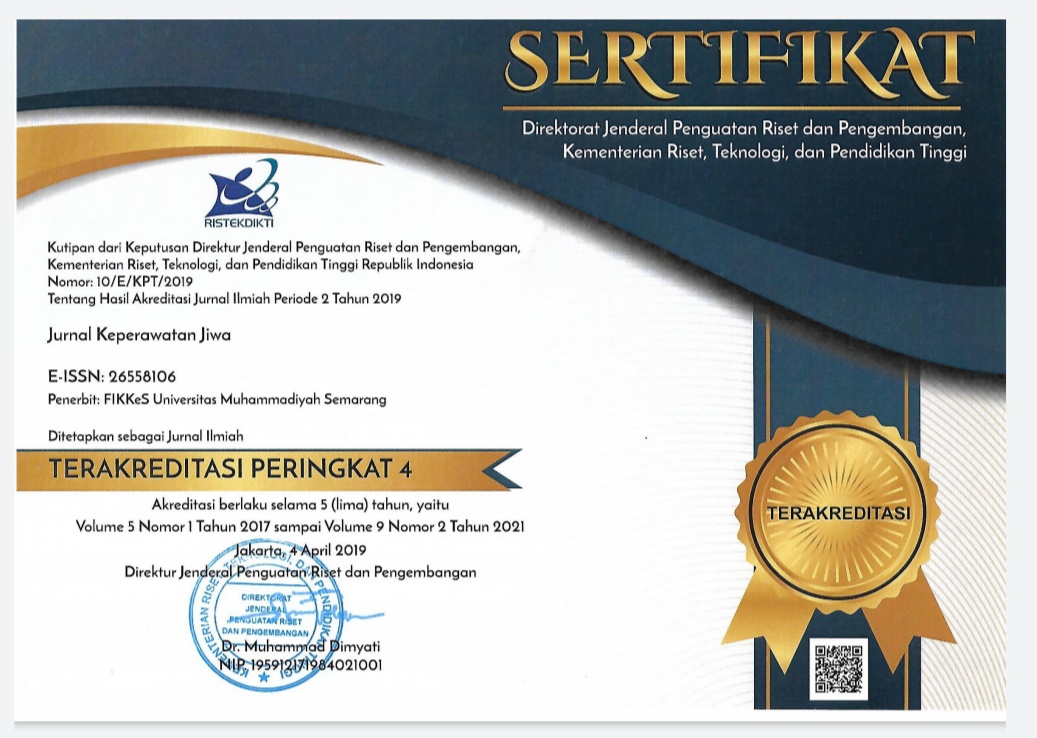Penggunaan Tele-Health Psikoedukasi pada Pasien Skizofrenia
(1) Magister Keperawatan Peminatan Jiwa, Fakultas Ilmu Keperawatan Universitas Indonesia
(*) Corresponding Author
Abstract
Perkembangan Ilmu pengetahuan dan teknologi informasi pada tatanan pelayanan kesehatan dan perawatan menuntut pelayanan keperawatan lebih professional dan inovatif dalam melakukan perawatan kepada pasien. Tele-Health Psikoedukasi adalah bentuk pemanfaatan teknologi informasi yang dikembangkan oleh perawat dalam melakukan Tindakan pemberian informasi dan edukasi pada pasien skizofrenia. Penelitian ini menggunakan literarature review yang berfokus pada Tele-Health Psikoedukasi. Literatur review ini terdiri dari sepuluh jurnal internasional melalui Online database (ScienceDirect, Clinical Key, Elsevier dari tahun 2015-2020). Mengetahui pemanfaatan penggunaan Tele-Health Psikoedukasi pada perawatan pasien dengan skizoprenia. Penggunaan Tele-health Psikoedukasi menunjukkan adanya efektifitas pemberian edukasi untuk pasien beserta keluarga dalam merawat berbagai gejala skizoprenia seperti, kecemasan, depresi. Tele-Health Psikoedukasi menjadikan proses pendampingan perawatan tidak terbatas oleh ruang dan waktu dan Tele-Health Psikoedukasi menjadi salah satu alternatif perawatan skizoprenia yang efektif.
Keywords
Full Text:
PDFReferences
Castro, A., Gili, M., Ricci-Cabello, I., Roca, M., Gilbody, S., Perez-Ara, M. Á., Seguí, A., & McMillan, D. (2020). Effectiveness and adherence of telephone-administered psychotherapy for depression: A systematic review and meta-analysis. Journal of Affective Disorders, 260(May 2019), 514–526. https://doi.org/10.1016/j.jad.2019.09.023
Dobkin, R., Durland, L., Interian, A., & Pretzer-Aboff, I. (2014). Effect of telehealth-to-home interventions on quality of life for individuals with depressive and anxiety disorders. Smart Homecare Technology and TeleHealth, November, 105. https://doi.org/10.2147/shtt.s45044
E-Therapy for Mental Health Problems : (2021).
Ferrari, M., Shakya, Y., Ledwos, C., McKenzie, K., & Ahmad, F. (2018). Patients’ Mental Health Journeys: A Qualitative Case Study with Interactive Computer-Assisted Client Assessment Survey (iCASS). Journal of Immigrant and Minority Health, 20(5), 1173–1181. https://doi.org/10.1007/s10903-017-0643-z
Fung, H. W., Chan, C., & Ross, C. A. (2020). A Web-based Psychoeducation Program for People with Pathological Dissociation: Development and Pilot Testing. Journal of Evidence-Based Social Work (United States), 17(4), 427–442. https://doi.org/10.1080/26408066.2020.1760990
Harerimana, B., Forchuk, C., & O’Regan, T. (2019). The use of technology for mental healthcare delivery among older adults with depressive symptoms: A systematic literature review. International Journal of Mental Health Nursing, 28(3), 657–670. https://doi.org/10.1111/inm.12571
Levy, C. E., Spooner, H., Lee, J. B., Sonke, J., Myers, K., & Snow, E. (2018). Telehealth-based creative arts therapy: Transforming mental health and rehabilitation care for rural veterans. Arts in Psychotherapy, 57, 20–26. https://doi.org/10.1016/j.aip.2017.08.010
Liang, H. Y., Hann Lin, L., Yu Chang, C., Mei Wu, F., & Yu, S. (2021). Effectiveness of a Nurse-Led Tele-Homecare Program for Patients With Multiple Chronic Illnesses and a High Risk for Readmission: A Randomized Controlled Trial. Journal of Nursing Scholarship, 53(2), 161–170. https://doi.org/10.1111/jnu.12622
Mehrotra, K., Chand, P., Bandawar, M., Rao Sagi, M., Kaur, S., G, A., Raj, A., Jain, S., Komaromy, M., Murthy, P., & Arora, S. (2018). Effectiveness of NIMHANS ECHO blended tele-mentoring model on Integrated Mental Health and Addiction for counsellors in rural and underserved districts of Chhattisgarh, India. Asian Journal of Psychiatry, 36(May), 123–127. https://doi.org/10.1016/j.ajp.2018.07.010
Moreau, J. L., Cordasco, K. M., Young, A. S., Oishi, S. M., Rose, D. E., Canelo, I., Yano, E. M., Haskell, S. G., & Hamilton, A. B. (2018). The Use of Telemental Health to Meet the Mental Health Needs of Women Using Department of Veterans Affairs Services. Women’s Health Issues, 28(2), 181–187. https://doi.org/10.1016/j.whi.2017.12.005
Palylyk-Colwell, & Argáez, C. (2018). Telehealth for the assessment and treatment of depression, post-traumatic stress disorder, and anxiety: clinical evidence. CADTH Rapid Response Report: Summary with Critical Appraisal, 1–43. https://search.proquest.com/docview/2032784226?accountid=28179
Pasadas, C., & Manso, F. (2015). Psychoeducation: A Strategy for Preventing Relapse in Patients with Schizophrenia. International Journal of Nursing, 2(1), 89–102. https://doi.org/10.15640/ijn.v2n1a10
Pauli, E., Bajjani-Gebara, J. E., O’Quin, C., Raps, S. J., & DeLeon, P. H. (2018). Telehealth – The Future for Advance Practice Mental Health Nursing. Archives of Psychiatric Nursing, 32(3), 327–328. https://doi.org/10.1016/j.apnu.2018.03.018
Pusat Data dan Informasi Kementerian Kesehatan RI. (2019). Situasi Kesehatan Jiwa Di Indonesia. In InfoDATIN (p. 12).
Rotondi, A. J., Anderson, C. M., Haas, G. L., Eack, S. M., Spring, M. B., Ganguli, R., Newhill, C., & Rosenstock, J. (2010). Web-Based Psychoeducational Intervention for Persons With Schizophrenia and Their Supporters: One-Year Outcomes. Psychiatric Services, 61(11), 1099–1105. https://doi.org/10.1176/appi.ps.61.11.1099
Sin, J., Gillard, S., Spain, D., Cornelius, V., Chen, T., & Henderson, C. (2017). Effectiveness of psychoeducational interventions for family carers of people with psychosis: A systematic review and meta-analysis. Clinical Psychology Review, 56(May), 13–24. https://doi.org/10.1016/j.cpr.2017.05.002.
Article Metrics
Abstract view : 557 timesPDF - 75 times
DOI: https://doi.org/10.26714/jkj.9.4.2021.861-868
Refbacks
- There are currently no refbacks.

This work is licensed under a Creative Commons Attribution 4.0 International License.
PPNI Univ. Muhammadiyah Semarang
Jl. Kedungmundu Raya No. 18 Semarang Gedung NRC University of Muhammadiyah Semarang
Phone: 02476740287
Fax: 02476740287
Email: [email protected]
This work is licensed under a Creative Commons Attribution 4.0 International License.


